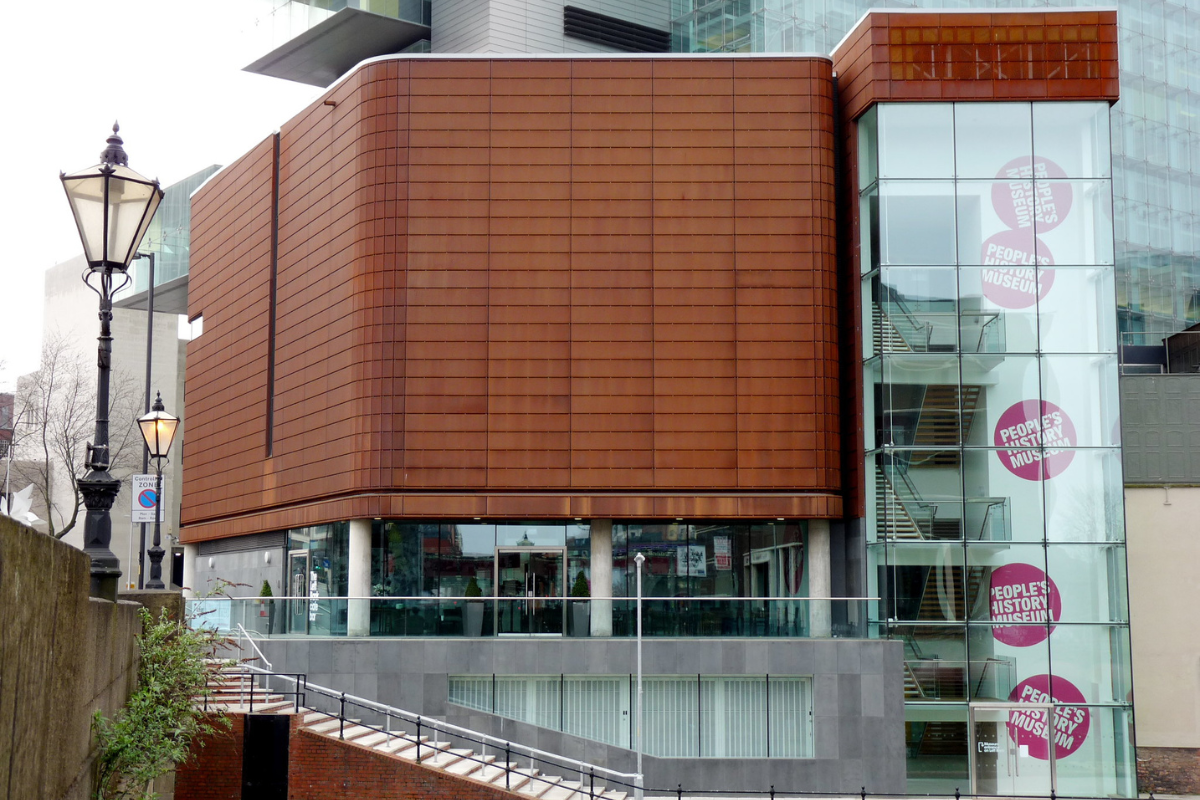
The People's History Museum says it is a public service provider, committed to upholding the Equality Act 2010
Photo: Megan Eaves via flickr
Museum closes on safety grounds during ‘gender critical’ event
Trans rights activists demonstrated outside a museum where a gender critical group was meeting, with police in attendance.
The People’s History Museum (PHM) in Manchester temporarily closed its doors to visitors last week on public safety grounds amid protests against gender-critical group Sex Matters, which had hired one of its events spaces.
During the event on Sunday (10 September), trans rights activists with banners and placards demonstrated outside the building, with Greater Manchester Police in attendance.
The museum, which is normally open from 10am to 5pm every day except Tuesday, was closed to the public.
READ MORE:
- Arts organisations 'increasingly anxious on trans issues'
- ACE harassment claim upheld as victimisation claims dismissed
In a statement to Arts Professional about the closure, a spokesperson at PHM said: “Hiring an event space at PHM is not an endorsement of activities, views or aims. We are a public service provider that is committed to upholding the Equality Act 2010.
“The closure of the museum [on Sunday] to the public followed advice on public safety grounds.”
Belief discrimination
It is not the first time Sex Matters has held an event at the venue. The organisation, which campaigns for “clarity on sex in law and policy”, booked a space at PHM in June.
The museum was heavily criticised for doing so, issuing an apology and stating that Sex Matters did not share its values.
However, the museum’s tweet and statement were later deleted “on legal advice” over concerns it could be at risk of legal action for belief discrimination.
Tax researcher Maya Forstater co-founded Sex Matters, having won a legal case against her former employer for discrimination based on her gender-critical beliefs. Responding to the museum's apology, Sex Matters said it was “shocked and saddened” and planned to write to the museum to book another meeting there.
On its website, PHM – the UK’s National Museum of Democracy – is described as “a welcoming organisation, committed to standing in solidarity with people who face persecution and discrimination.” The museum cites “championing trans inclusion” as an example of these values, visibly illustrated by the pride flags which have been on display in its cafe and bar since August.
Derby Museum
The closure and protests at PHM is not the only recent example of cultural institutions grappling with balancing trans-inclusivity with guidance on gender-critical rights.
On 2 September, a visitor to Derby Museum took to X, formerly Twitter, to complain that when their partner had tried to add JK Rowling’s name to an exhibition, a staff member removed it because of the author's views on gender.
The museum had invited the public to attach their own ‘history makers’ to a tree, together with their reasons for them being their heroine or hero.
In response, Derby Museums said the card was “temporarily removed” by a member of the front-of-house team to be reviewed by the exhibition curators, which is standard procedure if they are unsure of anything. However, this led to an exchange of views regarding the representation of women and transwomen in the gallery and the history makers tree.
A museum spokesperson said, “On this occasion, the card was taken back by the member of the public before it could be reviewed. We have since found the card in the gallery; it has been reviewed by exhibition curators and was pinned to the history makers tree late last week."
They added, “Derby Museums bases its activities around open debate and our visitors have many different views and backgrounds.
"We are not making any judgement about JK Rowling, who has made a huge contribution to the cultural life of the UK and, through her writing, has given pleasure to millions of people worldwide. She is a heroine to many people.”
Uncertainty and anxiety
The incidents come at a time of concern for arts and cultural organisations about trans-inclusive practice in light of recent legal cases.
Leicester University’s Research Centre for Museums and Galleries (RCMG) has said "numerous" cultural organisations have contacted it seeking advice about trans inclusion after case law clarified that gender-critical beliefs are protected under the Equality Act.
Guidance published by the university last week runs through several scenarios flagged by sector organisations. These included a request to hire event space from a group advocating for the rights of people with gender-critical beliefs and discussions with staff about trans rights in relation to women's rights.
Professor Richard Sandell, co-Director of RCMG, said the guidance addresses "the uncertainty and anxiety many cultural organisations are experiencing" and highlights the need for museums, galleries, heritage and archives to be "more ambitious in their trans-inclusive practice".
Join the Discussion
You must be logged in to post a comment.